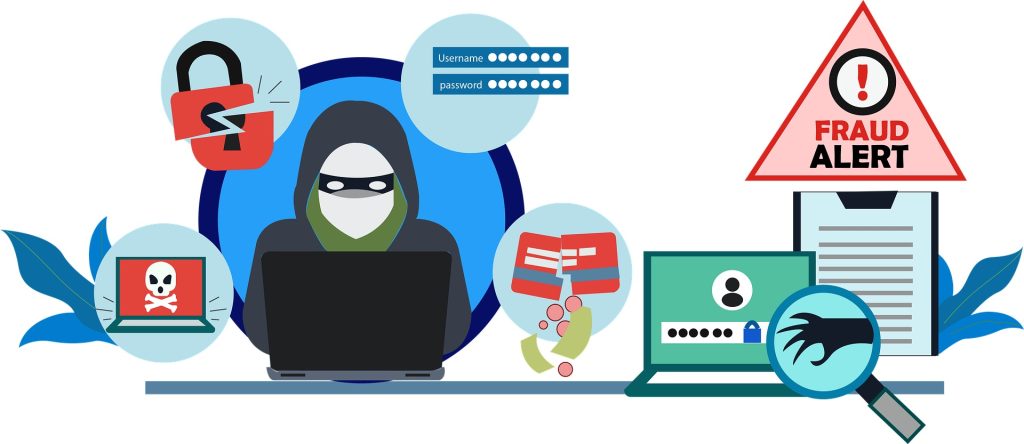Scams are attempts to defraud you or others to get your money, sensitive information, or other valuable assets after first gaining your trust. Scams exploit victims using a combination of the victim’s credulity, naïveté, compassion, vanity, confidence, irresponsibility, and greed. A scam is also known as a con, confidence trick, fraud or swindler.
A person who scams people is a scammer. This is a clever person who creates and uses cunning methods and tactics to deceive, confuse and exploit their targets (persons or organizations) into giving them money, personal details, or other valuable possessions. Such people are also called con artists, defrauders or swindlers.
Who can become a victim of scams?
Scammers target individuals from all walks of life. They know how to get around our better judgment. They play on our emotions or promise big payoffs to get us to act. Anyone can fall victim to a scam, regardless of age, education, or background. The age group most vulnerable to scams is actually 18 to 24 years olds.
How do you feel when you get scammed?
You might feel vulnerable and helpless, as well as a host of other emotions such as shame and embarrassment, anxiety, guilt, depression and fear, anger, grief, and a loss of trust and sense of security.
Why should you Be Aware of Scams
- To make informed judgments and distinguish between legitimate possibilities and malicious traps.
- To protect yourself against financial loss, mental distress, and identity theft and additional victimization
- By timely reporting the scams and scammers, we assist law enforcement in locating and prosecuting scammers.
- To ensure a safe online environment where trust is maintained in digital interactions and transactions.
Types of Scams
1. Online Scams
These are popular and pervasive scams involving false emails, messages, or websites. Phishing scams, fraudulent websites, online retail fraud, and romance scams are all examples.
- Phishing schemes include criminals impersonating trustworthy companies. They send you bogus emails demanding your personal or financial information to obtain sensitive information.
- Scammers construct bogus websites that seem like authentic ones and offer tempting discounts or possibilities. Unwary visitors enter their information or make purchases, only to realize that such transactions benefit scammers.
- Online shopping fraud takes advantage of the popularity of online shopping. They set up bogus online sites selling goods. They may claim that goods are never delivered to you once payments are made.
- Romance scams involve con artists constructing bogus online profiles. They appear to be interested in romantic relationships with you, and then emotionally manipulate you into giving money to the con artist.

2. Scams on the Phone
They are a persistent type of scam that is frequently launched by unwanted phone calls. Bank impersonation, tech support scams, and prize or sweepstakes fraud are all common types of scams. You or other victims are compelled to make urgent payments or pay fees or taxes to claim your profits.
3. Scams in the Investment Industry
Ponzi schemes and pyramid scams are examples of these. They take advantage of people’s desire to grow their riches by providing tempting chances.
- Ponzi schemes use the funds of new investors to pay returns to previous investors. When there are insufficient new investors to meet the promised returns, the operation fails.
- In pyramid schemes, individuals recruit others in exchange for financial benefits. Because of the power dynamics within the pyramid, they are unsustainable and will finally fall.
4. Charity Scams
They take advantage of people’s kindness by impersonating reputable organizations. They seek donations for fake causes. However, they misuse the cash for personal benefit rather than humanitarian goals.
Consequences for the person being scammed
1. Financial Losses
You can suffer severe financial losses ranging from a few dollars to life-changing sums. These losses might result in debt, depleted resources, and property losses. Scammers entice you with alluring promises, compromising their financial stability, credit rating, and long-term security.
2. Emotional Anxiety
Scam victims frequently experience feelings of betrayal, bitterness, frustration, guilt, anxiety, stress, and despair. You may feel lied to, annoyed, and blamed for not recognizing the scam sooner, and as a result, you may experience anxiety and tension.
3. Theft of Identity
Identity theft can result in financial ruin, legal troubles, and reputation damage when criminals open accounts or take out loans in your name.
4. Loss of Trust
Scams erode your trust in the digital and financial domains, leading you to avoid of legitimate opportunities, be cautious in relationships and have skepticism.
Scams weaken trust in institutions, instill fear, and offer a challenge to international prosecution, hurting entire communities and societies.
How to Spot Scams
Scams are rampant. New ones pop up all the time because scammers adapt to new technologies, the latest trends and current events. Detecting scams has become more sophisticated. There are some common warning signs and red flags can help people stay safe.
1. Suspicious Emails and Messages
Scammers frequently send you unwanted messages containing tempting offers or links. They may use misspelled or altered URLs, generic greetings, requests for personal information, and threats and urgency to compel victims to act immediately. Therefore, double-check URLs, avoid generic greetings, and be mindful of possible legal action.
2. Unsolicited Phone Calls
You need to be wary of unwanted phone calls from untrustworthy organizations. Avoid making hurried judgments or payments, and confirm the caller’s identity before providing personal or financial information. Usually, the real organizations rarely make such calls.
3. Offers That Appear to Be Too Good to Be True
Scammers frequently offer you free products or services in exchange for money for shipment or handling. So, double-check the legitimacy of these offers before investing.
4. Poor Grammar and Spelling
Scam communications usually have spelling and grammar errors, whereas real organizations communicate with a high level of professionalism.
5. Requesting Money via Unusual Methods
Scammers may request you to make payments in unusual ways, such as wire transfers, prepaid cards, or cryptocurrency, So, be wary if you’re asked to utilize these methods.
6. Unusual Requests for Personal Information
Legitimate organizations will only require your personal information such as bank account information or identity card information for legitimate reasons.
How to Keep Yourself Safe from Scams
For Online Scams
- Stay updated on fraud strategies and trends by following sources like government agencies, consumer protection organizations, and financial institutions.
- Create strong passwords for your online accounts by combining uppercase and lowercase letters, numbers, and symbols. Don’t use easily guessable information like birthdays or names.
- If something seems strange or too good to be true, trust your instincts and be cautious. It’s important to be careful and not get tricked.
- Enable a multi-factor authentication (MFA) for your accounts to increase your online security. This means you’ll need a secondary verification method, such as receiving a text message on your phone.
- Use reliable antivirus software, firewalls, and ad-blockers to protect your computer and mobile devices from malware and phishing attacks.
- Update your operating system, web browsers, and antivirus software with the latest security patches to defend you against the latest threats.
- Be aware, and suspicious, and conduct a rigorous evaluation of messages and offers.
- Don’t click on suspicious links or download unexpected attachments from emails. Scammers could use them to send malware or phishing attempts.
For other types of scams
- Be wary of unsolicited offers, confirm their credibility, and confer with reputable individuals, before you proceed to take make payments or submit your personal information.
- Independently verify the offer’s legitimacy by contacting the organization directly using their official contact details before paying any money or sharing your personal information.
- Maintain personal privacy by exercising caution when exchanging sensitive information over the phone or online. Don’t post sensitive information on social media and never disclose your personal information to unsolicited contacts.
- Shred any of your personal information before disposing of crucial documents such as passports and financial records.
- Check the credibility of a charity before you donate to it.
- Report suspicious activity to authorities, local law enforcement, or consumer protection organizations to prevent others from becoming victims.
- Check your bank and credit card statements regularly to search for any unauthorized transactions, and inform your financial institution if you find any discrepancies.
- Stay aware of scammers by sharing their information and your knowledge on scams with friends, family, and coworkers to help build a network of fraud prevention.
- Be cautious and thoughtful when you’re considering offers and requests because scammers frequently put you under pressure to make quick decisions.
What Should you do if you Fall Victim to a Scam?
- Remain calm. Stop all conversation and document any communication with the scammer. Hang up the phone. Do not reply the email or text. Block the scammer’s email address in your email program. Unfriend the scammer from any social media sites and report their profile to the site. Contact the postal service and ask them to block any mail from the scammer. Keep records of all contacts with the scammer.
- Report the scam to the authorities.
- Notify your bank or any other organization of an unauthorized change of passwords for compromised accounts.
- Update your the security of your accounts by using strong passwords and enable multi-factor authentication for added security.
- Monitor your financial and other accounts for strange behavior to protect yourself from identity theft frauds.
- Seek legal counsel if the scam resulted in significant financial or other losses.
- Inform friends and relatives about the scam.
- Learn from the experience and take preventative actions, such as educating yourself about common scams.
- Be wary of follow-up scams, as scammers frequently target vulnerable people.
Conclusion
Scams pose a significant threat to individuals of all backgrounds and ages. You should recognize the warning signs and staying informed about the latest fraud tactics to protect yourself from becoming a victim of scams. Follow best practices such as verifying offers, safeguarding your personal information, and reporting suspicious activity. You’ll reduce the risk of financial losses and identity theft. If you do become a victim of a scam, it’s important to remain calm, report the incident to the authorities, and take proactive measures to secure your accounts and prevent further harm. Stay vigilant and share knowledge about scams with others. We can collectively work towards creating a safer digital environment for everyone.


